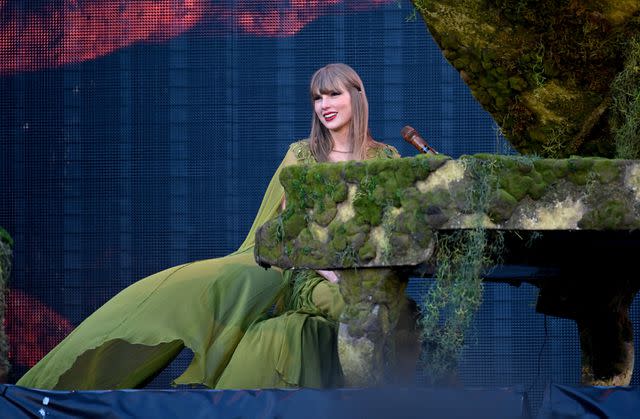Taylor Swift Fans 'Quake It Off' at Edinburgh Eras Tour Concert! Find Out Which Songs Created Seismic Activity
The song that drew the largest seismic activity was "... Ready for it?," in which fans’ dancing and singing reached 160 beats per minute (bpm)

Gareth Cattermole/TAS24/Getty
Taylor Swift in Edinburgh on June 7Taylor Swift fans in Scotland made sure to shake it off during her concert!
Fans who attended the Grammy winner’s Eras Tour stop at Murrayfield Stadium in Edinburgh on Friday, June 7, caused some major seismic activity, according to the British Geological Survey (BGS).
The agency recorded several seismic hits during specific songs throughout her concert, in which her audience did anything but "calm down." The seismic activity was detected by two monitoring stations, the furthest of which was 6 km (or 3.7 miles) away.
The song that drew the largest seismic activity was “... Ready for it?,” in which fans’ dancing and singing reached 160 beats per minute (bpm). According to the BGS this transmitted 80 kW of power, which is “equivalent to around 10-16 car batteries.”
Related: Taylor Swift Thrills Edinburgh Food Bank with Generous Donation: Will 'Leave a Lasting Impact'
The audience also danced and sang their hearts out to “Cruel Summer,” which also hit 160 bpm and “Shake it Off.” Another big moment that drew seismic activity came after Swift finished singing “Champagne Problems,” as it drew four minutes of applause at a frequency of 120 bpm.
Other “seismic hits” happened during “Getaway Car,” a track from Reputation and her new track “But Daddy I Love Him” from her most recent album, The Tortured Poets Department, according to a BGS post on X (formerly known as Twitter).
The BGS noted that the energy at Friday’s concert “was the most energetic” out of the weekend “by a small margin,” as it recorded “23.4 nanometres (nm) of movement, versus 22.8 nm and 23.3 nm on the Saturday and Sunday respectively.”

Gareth Cattermole/TAS24/Getty
Taylor Swift performs in Edinburgh on June 7The agency shared the news on social media with a high energy post that read, “Quake it off! Seismometers around Edinburgh were triggered by the rapturous Taylor Swift crowds at Murrayfield Stadium over the weekend.”
This isn’t the first time the “Fortnight” singer’s concerts have shook the Earth. During her Seattle Eras Tour concert at Seattle's Lumen Field in July 2023, seismologist Jackie Caplan-Auerbach noted that dance activity from her fans caused seismic activity "equivalent of a 2.3 magnitude earthquake.”
She likened it to when Seattle Seahawk fans went wild over Marshawn "Beast Mode" Lynch's incredible touchdown during the NFC Wild Card game against the New Orleans Saints. However, she also noted that the "shaking" from Swift fans "was twice as strong as 'Beast Quake.' "
Never miss a story — sign up for to stay up-to-date on the best of what PEOPLE has to offer, from juicy celebrity news to compelling human interest stories.PEOPLE's free daily newsletter

Gareth Cattermole/TAS24/Getty
Taylor Swift performs in Edinburgh on June 7"For Taylor Swift, I collected about 10 hours of data where rhythm controlled the behavior. The music, the speakers, the beat. All that energy can drive into the ground and shake it," Caplan-Auerbach said.
A study conducted by researchers at Caltech and UCLA also found that when Swift brought her concert to SoFi Stadium in August 2023, 70,000 Swifties' jumping and dancing also created seismic activity. That study found that her song "Shake It Off" produced the largest local magnitude of 0.851 and "Love Story" also had a significant amplitude.
For more People news, make sure to sign up for our newsletter!
Read the original article on People.

 Yahoo News
Yahoo News 
